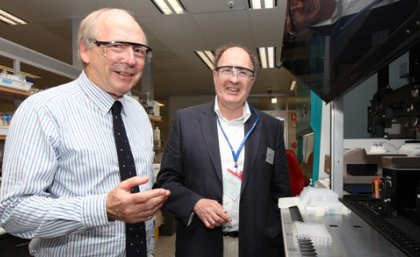
The Australian Institute for Bioengineering and Nanotechnology has hosted British monoclonal antibody pioneer Sir Greg Winter for a lab tour as part of a strategic collaboration with biotechnology company Biosceptre International.
Sir Greg visited labs where researchers, under the directorship of Prof Peter Gray, produce new-generation biologics as possible human therapeutics using cutting-edge techniques and specialised equipment.
The visit was as part of Sir Greg’s role as board member of Biosceptre, which develops and commercialises antibody technologies for the diagnosis and treatment of cancer.
AIBN signed a deal with Biosceptre, through investment company Medigen to further develop a bio-process for antibody production ahead of pre-clinical trials for biologics targeting cancerous tumours.
Researchers led by AIBN operations manager/supervisor Dr David Chin are using cultured mammalian cells to develop therapeutic-grade biologics for clinical studies.
“Sir Greg is a renowned scientist,” Professor Gray said. “To have him visiting and making a personal connection with us is very rewarding.
“We are recognised as one of the leading mammalian cell expression labs in Australia, able to produce quality and quantity.”
Biologics are medicines based on natural proteins made using DNA technology, offering exciting new treatment options for a wide range of diseases including cancer and auto-immune disorders.
Biologics may be used for a variety of medical conditions for which there are no other treatments.
AIBN secured the deal with Biosceptre because of the institute’s specialised facilities, ensuring mammalian cells can be grown in sterile areas with minimal chance of contamination.
Initial research in laboratory tests shows Biosceptre’s antibodies target a receptor which is considered a universal marker for cancer cells.
Biosceptre chief executive officer Dr Cliff Holloway said: “Our long-term goal is to develop a therapeutic monoclonal antibody capable of specifically detecting the universal cancer marker and inducing cancer cell death without affecting normal healthy cells.”
Sir Greg is the British biochemist who developed the world's first fully human antibody, replacing less successful ones which had until then been derived from mice.
He is a Fellow of Trinity College, Cambridge and has been named as the next Master. Sir Greg is Deputy Director of the Laboratory of Molecular Biology, Medical Research Council and Head of the Division of Protein and Nucleic Acids Chemistry.
Media: Erik de Wit, ph +61 7 3346 3962. www.aibn.com.au
.jpg)

